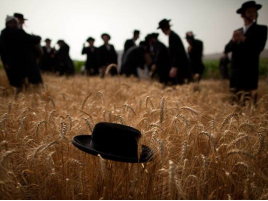Jobless Ultra-Orthodox Weigh On Israel’s Economy
By Maayan Lubell | Apr 16, 2011

Meir Gross is a Jewish ultra-Orthodox father of five who does not work. Despite warnings that Israel’s economy may be threatened by his fast growing, often unemployed, community, he does not want a job.
Gross advocates a pious existence geared to study. He spends nearly his entire day learning Torah (Jewish law), which he says is the most important edict bestowed on the Jewish man, and it cannot be combined with a job.
“Torah study demands utter and complete devotion. We’re not interested in making money or in material luxury. We are content with very little and our true joy, and highest duty, is learning,” Gross said.
Ultra-Orthodox Jews, or “Haredim,” are a devout tight-knit community who make up 8-10 percent of Israel’s 7.7 million population, with eight children per family on average. Many are supported by the state and live well below the poverty line.
A Bank of Israel report in March said about 60 percent of Haredi men don’t work.
But in 20 years the Haredim will make up 17 percent of the work force and many analysts say Israel’s economy will suffer enormously if things do not change.
“They are a real danger to Israel,” said Omer Moav, economics professor at the University of London and the Hebrew University in Jerusalem. “If we go bankrupt it’s the end of the story for us. Our strong army rests on a strong economy.”
The Haredim traditionally keep to their own towns or neighborhoods, where men walk the streets in traditional black garb and broad hats while women wear long dark dresses and cover their hair with hats, scarves or wigs.
Read more: http://www.reuters.com/article/2011/04/14/us-israel-ultraorthodox-economy-idUSTRE73D25W20110414















